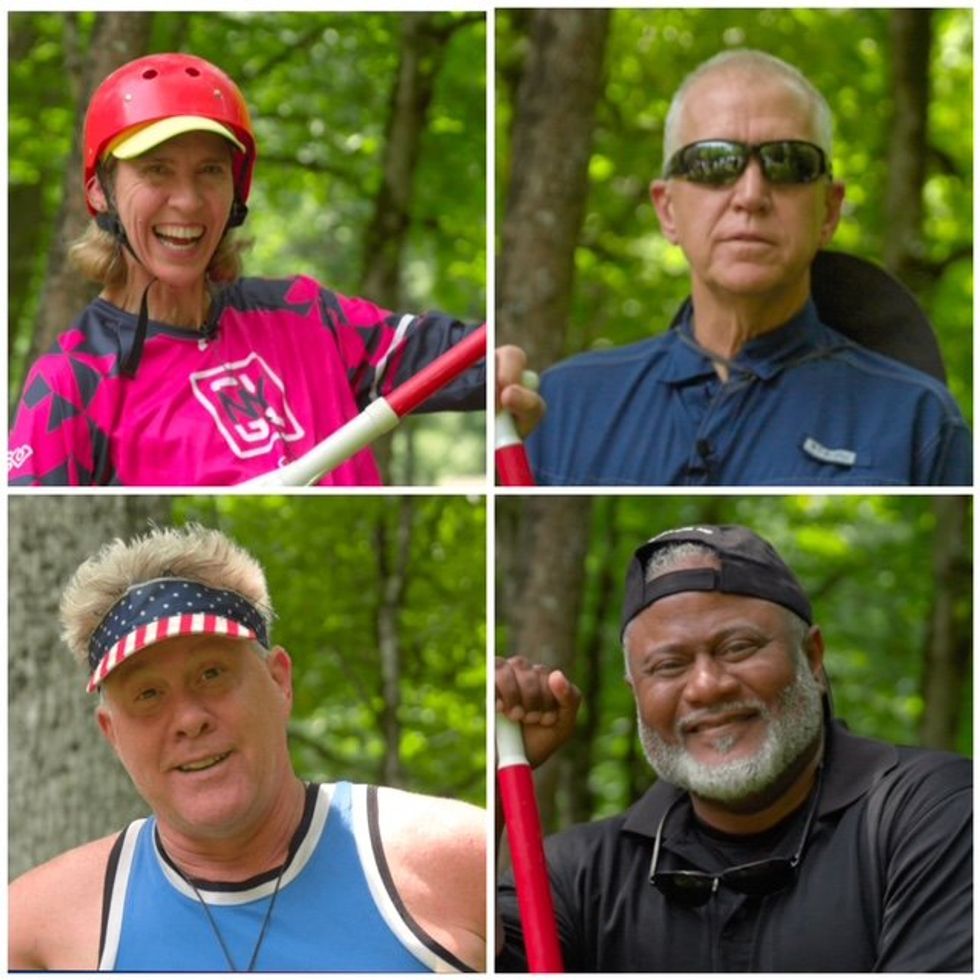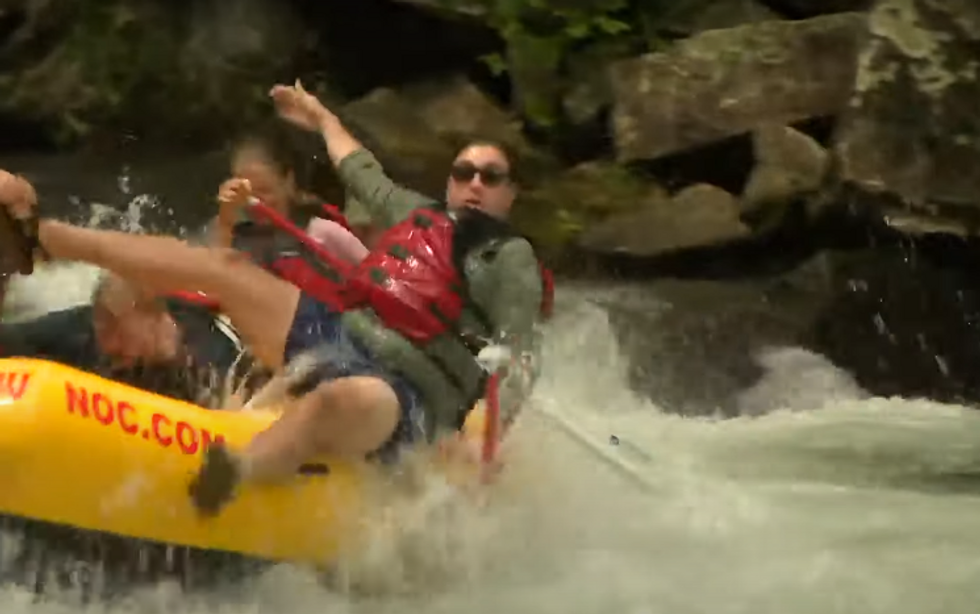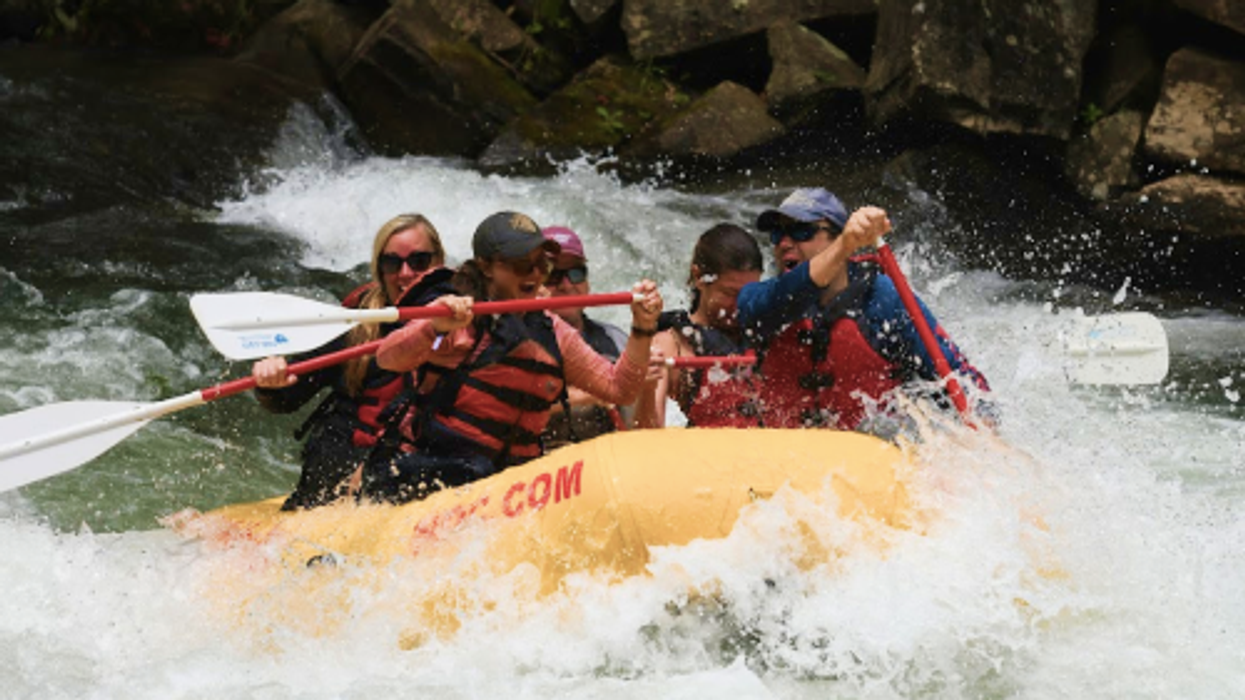A heavy morning mist was still wafting up from the river when CBS's advance team pulled into the parking lot at the Nantahala Outdoor Center. Those of us on the R.A.F.T. ( R euniting A mericans by F ostering T rust) for America team would soon be welcoming our invitees - unlikely red/blue pairs of politicians, community leaders, and lay people. CBS was there to see what would happen when these polar opposites were asked to engage with one another, on and off the river.
For example, North Carolina's Senator Thom Tillis (R) would be sharing a raft with the former mayor of Charlotte, Jennifer Roberts (D). In another raft, Rev. Dr. Rodney Sadler (D) would be paired up with Lance Moseley (R), a conservative Trump supporter.
 (From left to right, beginning at the top) Jennifer Roberts (D), Thom Tillis (R), Lance Moseley (R), Rev. Dr. Rodney Sadler (D)
(From left to right, beginning at the top) Jennifer Roberts (D), Thom Tillis (R), Lance Moseley (R), Rev. Dr. Rodney Sadler (D)
At its core, R.A.F.T. represents a simple experiment with far-reaching implications. It rests on the premise that, as Americans, we are all in the same boat together, and no matter what the challenge, we do better by pulling together than by pulling apart.
We'd all be testing this premise very soon - by challenging the rapids of the iconic Nantahala River, not far from Ashville in western North Carolina - the same area that a few weeks later would be obliterated by Hurricane Helene.
Our red/blue pairs of participants knew two things about the day's itinerary:
- They knew they'd be matched up for the day with someone from a dramatically different background, culture, religion, or political persuasion.
- They knew they'd be challenged not just by the river's rapids but also by engaging in the kinds of conversations that Americans from different backgrounds are finding increasingly difficult to have.
As the morning mist gradually lifted, the mood remained one of wariness and apprehension. Some pairs found it difficult to connect at all. Rodney and Lance confessed to CBS host Major Garrett that they had "absolutely nothing in common, not even our choice of smartphones."
Over the next hour, a few dozen more elected officials and lay people arrived, got the whitewater rafting "safety talk," and worked their way to the launch site. The river was cold, the air still chilly, but spirits were warming to the task at hand - stepping outside our comfort zones and tackling more than seven miles of raucous whitewater.
Fast forward three dripping-wet hours.

With the exception of one harmless man-overboard in Nantahala Falls (a wonderful photo op provided by Senator Tillis' Chief of Staff), we all reached the take-out point in high spirits and, importantly, with new-found respect for our raftmates who, on any other day, in any other place, we might have been disinclined even to have a conversation with.
Our new friends Lance and Rodney agreed to one more interview together. This time, they talked about the ideas they had shared on the river and how many of them weren't as different as they had originally thought they'd be. They applauded each other's willingness to actually listen with intellectual curiosity. And they concluded that "we're not as far apart as we thought we were."
More importantly, they laughed together, joked together, poked each other playfully, and ended their day in an embrace punctuated by the affirmation that "I love ya brother" - on national TV!
The lessons from R.A.F.T. for America are simple but profound. Reaching out and connecting across our differences doesn't need to be scary; it doesn't need to be hard work; it doesn't even need to be awkward. Quite the contrary, stepping outside our comfort zone - whether on whitewater or in politics - helps us feel pretty darn good about that person on the other side of the issue, and it can make us feel pretty darn good about ourselves, too.
Each of us has this capacity. More than ever, America needs us to let go of our biases and unleash that innate inclination to be curious about every new thing in the world - especially the new people we engage with, regardless of their politics.
There are undoubtedly rough currents ahead. Lots of them. There always have been. And there always will be. R.A.F.T. for America is proving that we can navigate the rough spots together if we just dig a little deeper, let go of some of our preconceptions, find value in our differences, and give each other half a chance. As Lance and Rodney discovered, to their mutual surprise, "we're not really that different."
To leverage Americans' vision and inspiration into concrete action, there are no better places to start than teamdemocracy.org, citizenconnect.us, and conversation.us.




















